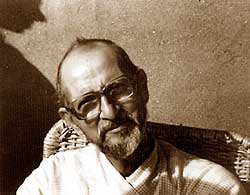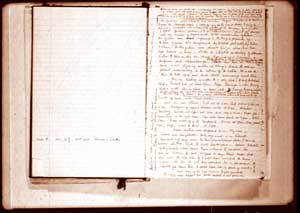 Starting this week, Nepali Times will serialise the previously unpublished diaries of BP Koirala from the period immediately following his return to Nepal with a call for "national reconciliation" between the monarchy and democratic forces. The entries begin exactly 25 years ago on 30 December 1976, the day BP arrived in Kathmandu after eight years of exile in India. At that time India itself was under Indira Gandhi's emergency rule, and spearheading the movement
Starting this week, Nepali Times will serialise the previously unpublished diaries of BP Koirala from the period immediately following his return to Nepal with a call for "national reconciliation" between the monarchy and democratic forces. The entries begin exactly 25 years ago on 30 December 1976, the day BP arrived in Kathmandu after eight years of exile in India. At that time India itself was under Indira Gandhi's emergency rule, and spearheading the movement  against it was BP's friend and well-wisher Jayaprakash Narayan. An earlier publication, Atmabrittanta: Late Life Recollections, which is not a diary, does not cover the last six years of Koirala's eventful life. These diaries fill that void.
against it was BP's friend and well-wisher Jayaprakash Narayan. An earlier publication, Atmabrittanta: Late Life Recollections, which is not a diary, does not cover the last six years of Koirala's eventful life. These diaries fill that void.
The diaries are available on microfilm at the Madan Puraskar Pustakalaya, and were donated by senior advocate Ganesh Raj Sharma. A copy is also with the Jawaharlal Nehru Museum and Library at Teen Murti Bhavan, New Delhi. Transcription of this series was done by Subir Shrestha and Miku Dixit, and will appear every fortnight in this space.
The Diary
GANESH RAJ SHARMA
The pages of BP's jail diary in English record the inner turmoil of a man under incarceration-a man who shows extraordinary love for his wife, children and family. But it was his devotion to the country, and commitment to the cause of democracy that were even stronger. It was this that forced him to pay the price depicted in this diary. Future generations of Nepalis need to know about BP's sacrifice, and the reason why this material is being serialised in the Nepali Times.
BP led the Revolution with success in 1951, led Nepal's first democratically elected government in 1958, but was abruptly removed from power and put in jail for eight years in 1960. After his release, finding no constitutional alternative, he organised an insurrection while in exile in India. Contemporary events in South Asia alarmed him about the danger to Nepal's independence. Having tried in vain to gauge the mind of the new King Birendra from exile, he returned to Nepal 25 years ago this week with a call of national reconciliation between the monarchy and the people. He maintained that the struggle for democracy would be futile if Nepal lost its independence.
The diary of the years after his release from Sundarijal, to seek treatment for cancer in the United States, remain incomplete. Being one of his lawyers, I was close to him during his trial for sedition and rebellion. I remained with him till his death in 1982. In failing health, and suffering acutely, he instructed his niece Shailaja to make available all his diaries which he had maintained since 1950. Unfortunately, Shailaja could only trace his jail journal, which has already been published, and this diary written in English. Keeping in view the relevance of the matter in Nepal's present political context, I decided with an implied consent of BP's successors to have this diary published. It is a coincidence that the beginning of this serialisation occurs on the 25th anniversary of BP's return to Nepal and his re-imprisonment at Sudarijal Jail.
Cast of characters
Sushila: Sushila Koirala, BP's wife
GM: Ganesh Man Singh, senior Congress party leader
Shriharsha: BP's son
Jayaprakashji: Indian statesman Jayaprakash Narayan
Shailaja: Shailaja Acharya, BP's niece, deputy prime minister in 1998
Nilambar Panthi: Nepali Congress worker
Rambabu: Rambabu Prasai, who later became treasurer of the Nepali Congress party
Khumbahadur: Khum Bahadur Khadka, present Home Minister
Anchaladish: Zonal Commissioner, a position abolished after the end of the Panchayat era
30/12/76
Sundarijal
Reached Kathmandu from Patna by RNAC plane. Members of my family and a large number of friends including Jayaprakashji came to the Patna airport to see us off. Most of us were in tears. I am deeply touched by the uncontrollable demonstration of love for me. Since my arrival at Patna day before, I have been receiving a stream of friends and well-wishers. They know that an uncertain and anxious future awaits me when I arrive at Kathmandu-hence their concern. Sushila has been in desperate agony for the last so many days. She weeps too easily. I pray that she goes through the crisis without damage to her health. She has alarmingly high blood pressure which has caused some damage to her heart.
On arrival at Kathmandu airport our plane was taken to the far end of the runway, where we-(GM, Shailaja, Nilambar Panthi, Rambabu, Khumbahadur and myself) were deplaned, and airport formalities were completed there in a tent set up for the people. At that point we were separated. Myself and GM were brought to the Sundarijal camp by a police jeep. Shailaja was taken away in another jeep. She waved a goodbye as she was being driven away. Others were taken away in another jeep. Back again at the Sundarijal detention camp. It has received a new coat of fresh paint and is whitewashed. Now the military takes charge of us. Back to the good old days. I feel relaxed in this surrounding and tell GM so. I am relaxed, alas, because I am free from Indira's [Gandhi's] chicanery and double dealing and the atmosphere of confusion there. The relief is also due to the fact that the period of uncertainty about the course of action is now over by our return to Nepal. Die is cast.
Anchaladhish with military and civilian officers came and asked some questions. The unusual part of the session was the inclusion of military and police officers in the government team headed by Anchaladhish. Why were they associated? Another unusual thing was the tape recording of our statement (ie our reply to the questions).
The questions were about seven in number. Before I replied to them I gave the Anchaladhish a copy of my statement which I had printed and circulated clandestinely stating the purpose of my return to Nepal. Questions pertained to our expressed apprehension about the danger to the very existence of Nepal and to the machination of India. One question referred to the King's proposal of the Zone of Peace to be recognised by the world, particularly by India and China. Another question was about Girija who had been left behind in India-whether I indicated a strategy of alternative action. Still another was about hijacking and 300,000/- and action in Okhaldhunga. The seventh question was-will my coming not jeopardise Nepal? I told him that we have come and are placing ourselves at the King's hands to achieve political understanding in the interests of the nation. It is not the time to rake up the past and start accusing each other.
They are treating us well. It is very cold. I had disturbed sleep-I went to bed at about eight pm. I hope Shailaja is also being treated well. She is alone in some jail. I asked Anchaladhish about her-they said that she was being nicely looked after and that I don't have to worry. When we were settled in the camp and the Anchaladhish had already left, a bulky fellow, who introduced himself to us as DSP in charge of the airport, came with about half a dozen young toughies. DSP was tall and a little fat and his fingers were small and stout. He came to tell me that my gloves which I had lost at the airport were not available. But why with six men? To identify us to them?
31/12/76
Sundarijal
I woke up sad and homesick.
Jail life has started. I got up at 5AM. Got morning tea at 5:45. Breakfast of eggs and toast and milk at 8AM. Attempted reading. Lunch at 1PM with rice, dal, veg, and curd. Slept for sometime in the afternoon. Tea with some fruits at 4PM. I did some brisk walking in the compound. Dinner at 7PM. Rice, meat, dal, sag. Went to bed at 8PM.
Soon heaters were supplied to us. My room is warm and comfortable. Only my mind is in turmoil remembering dear ones. In this psychological state, I can't do serious studies. Tried to read Santayana-couldn't concentrate. Today Sushila and others must have returned to Varanasi. She has no money to last beyond 10 days. I don't know what she will do after that. If I could have arranged to leave money with her so that she wouldn't be in financial trouble for sometime, I would have been in peace of mind.
Last day of the year 1976-I look forward to 1977 with hope for both Nepal and our family.


